Organisational Behaviour Report: Sainsbury's, Semester 1 Analysis
VerifiedAdded on 2023/01/13
|16
|3838
|96
Report
AI Summary
This report provides a comprehensive analysis of organisational behaviour within the context of Sainsbury's, a UK-based supermarket chain. The report begins by examining the influence of organisational culture, politics, and power dynamics on individual and team performance, exploring different cultural types, network and systems theories, and the impact of power structures. It then delves into various theories of motivation, including content theories like Maslow's Hierarchy of Needs and process theories such as Vroom's Expectancy Theory, along with an analysis of their application within Sainsbury's. Furthermore, the report differentiates between effective and ineffective teams, providing insights into team dynamics and leadership styles. Finally, the report applies concepts and philosophies of organisational behaviour to specific scenarios, offering practical recommendations for improving performance and fostering a positive work environment within the organisation.
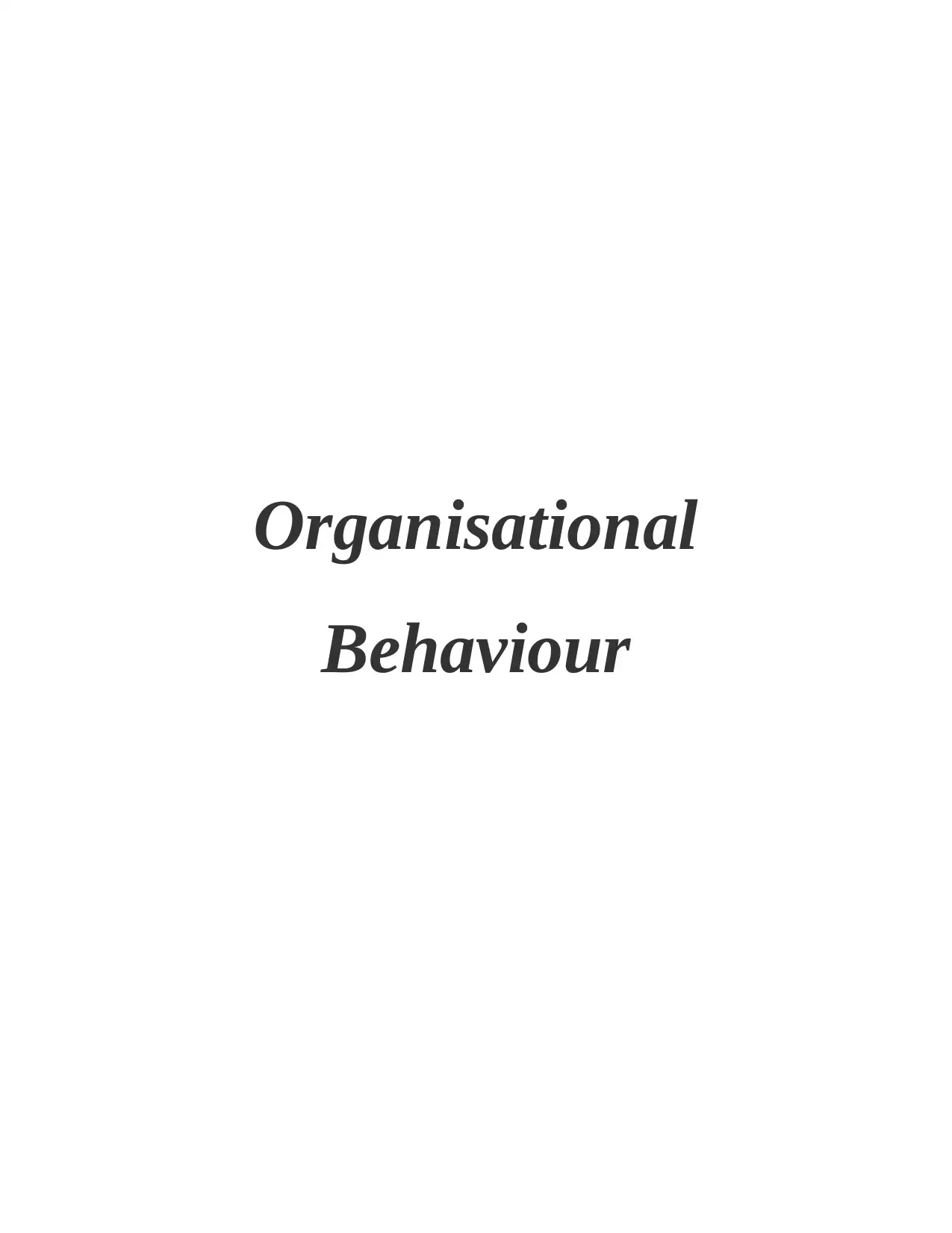
Organisational
Behaviour
Behaviour
Paraphrase This Document
Need a fresh take? Get an instant paraphrase of this document with our AI Paraphraser
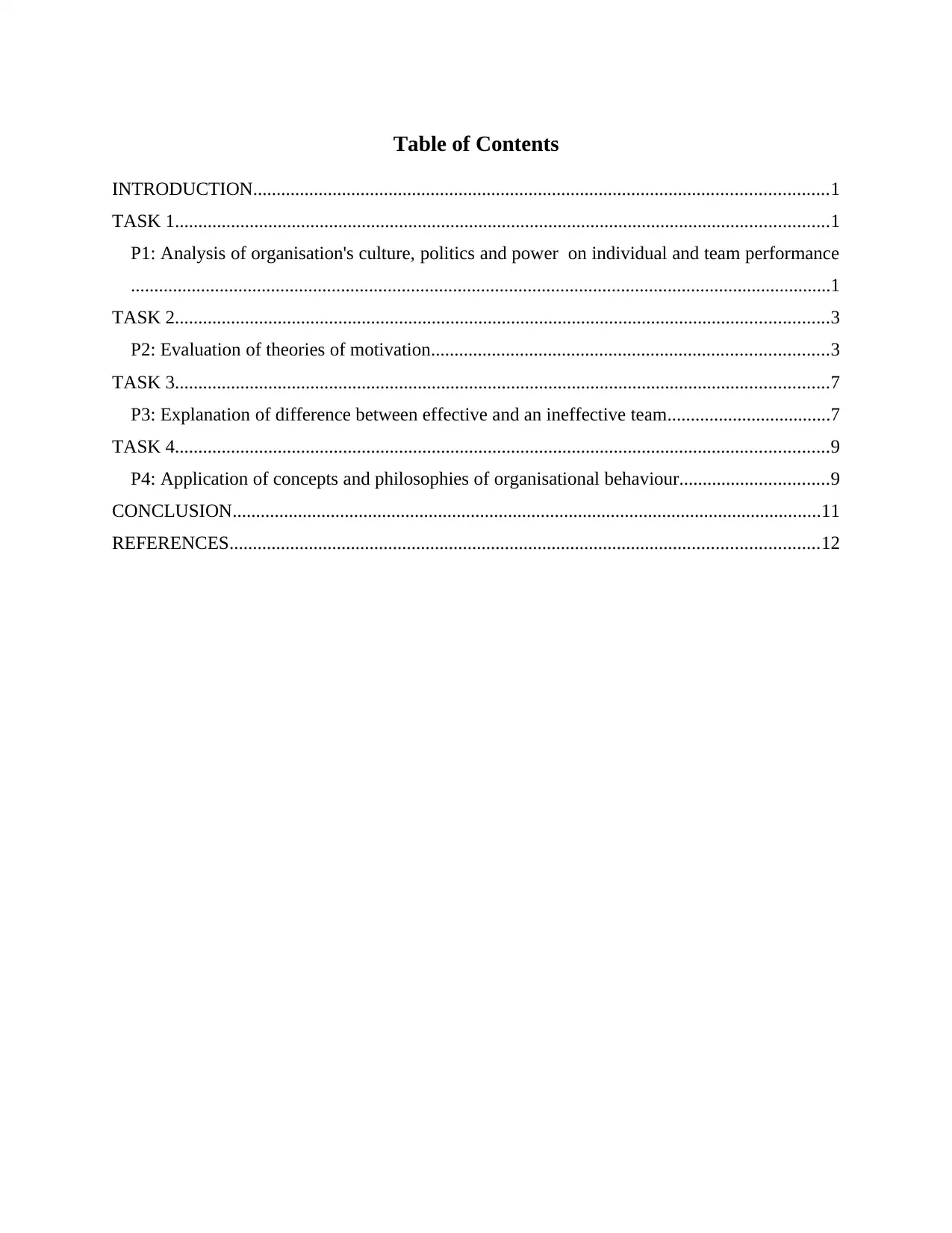
Table of Contents
INTRODUCTION...........................................................................................................................1
TASK 1............................................................................................................................................1
P1: Analysis of organisation's culture, politics and power on individual and team performance
......................................................................................................................................................1
TASK 2............................................................................................................................................3
P2: Evaluation of theories of motivation.....................................................................................3
TASK 3............................................................................................................................................7
P3: Explanation of difference between effective and an ineffective team...................................7
TASK 4............................................................................................................................................9
P4: Application of concepts and philosophies of organisational behaviour................................9
CONCLUSION..............................................................................................................................11
REFERENCES..............................................................................................................................12
INTRODUCTION...........................................................................................................................1
TASK 1............................................................................................................................................1
P1: Analysis of organisation's culture, politics and power on individual and team performance
......................................................................................................................................................1
TASK 2............................................................................................................................................3
P2: Evaluation of theories of motivation.....................................................................................3
TASK 3............................................................................................................................................7
P3: Explanation of difference between effective and an ineffective team...................................7
TASK 4............................................................................................................................................9
P4: Application of concepts and philosophies of organisational behaviour................................9
CONCLUSION..............................................................................................................................11
REFERENCES..............................................................................................................................12
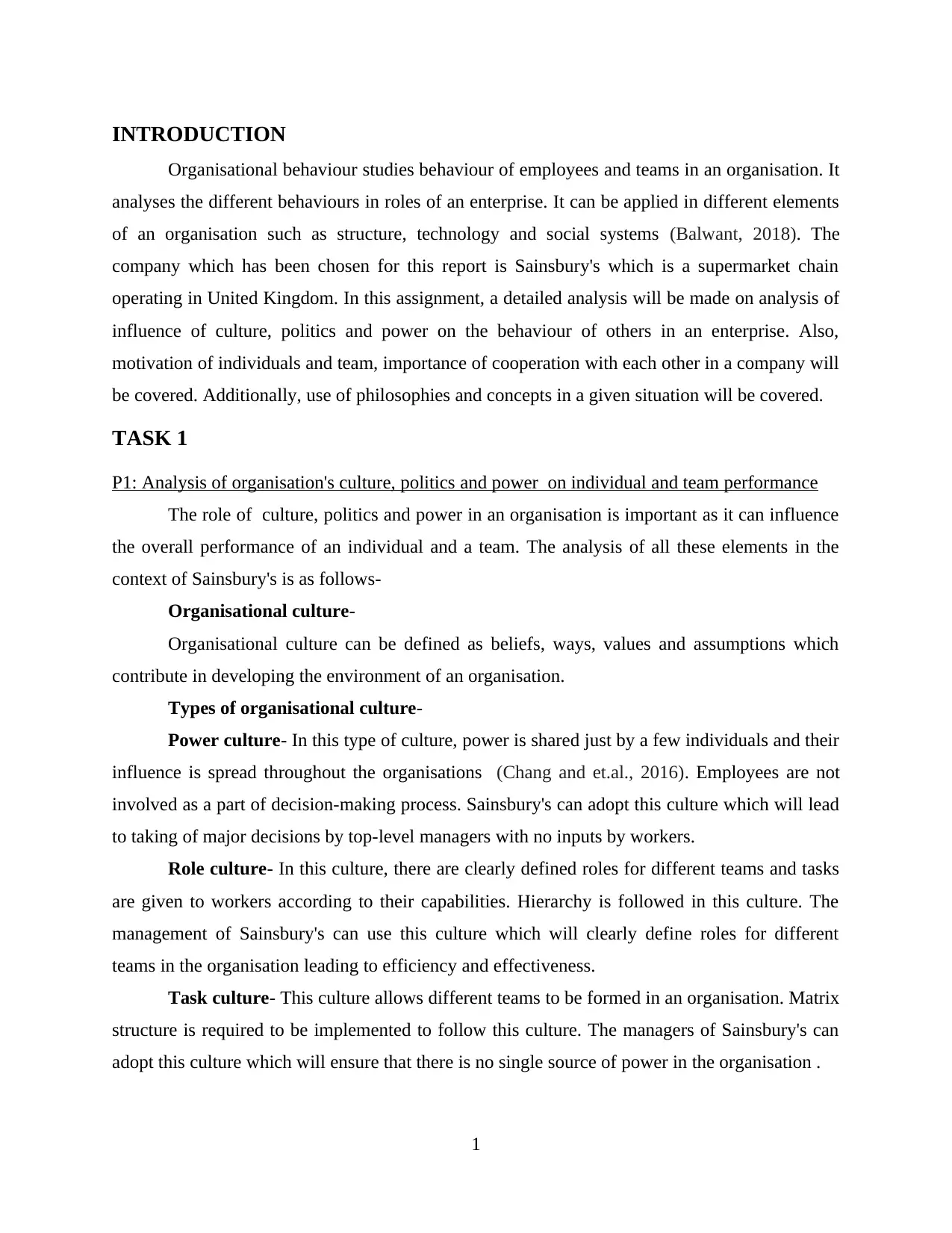
INTRODUCTION
Organisational behaviour studies behaviour of employees and teams in an organisation. It
analyses the different behaviours in roles of an enterprise. It can be applied in different elements
of an organisation such as structure, technology and social systems (Balwant, 2018). The
company which has been chosen for this report is Sainsbury's which is a supermarket chain
operating in United Kingdom. In this assignment, a detailed analysis will be made on analysis of
influence of culture, politics and power on the behaviour of others in an enterprise. Also,
motivation of individuals and team, importance of cooperation with each other in a company will
be covered. Additionally, use of philosophies and concepts in a given situation will be covered.
TASK 1
P1: Analysis of organisation's culture, politics and power on individual and team performance
The role of culture, politics and power in an organisation is important as it can influence
the overall performance of an individual and a team. The analysis of all these elements in the
context of Sainsbury's is as follows-
Organisational culture-
Organisational culture can be defined as beliefs, ways, values and assumptions which
contribute in developing the environment of an organisation.
Types of organisational culture-
Power culture- In this type of culture, power is shared just by a few individuals and their
influence is spread throughout the organisations (Chang and et.al., 2016). Employees are not
involved as a part of decision-making process. Sainsbury's can adopt this culture which will lead
to taking of major decisions by top-level managers with no inputs by workers.
Role culture- In this culture, there are clearly defined roles for different teams and tasks
are given to workers according to their capabilities. Hierarchy is followed in this culture. The
management of Sainsbury's can use this culture which will clearly define roles for different
teams in the organisation leading to efficiency and effectiveness.
Task culture- This culture allows different teams to be formed in an organisation. Matrix
structure is required to be implemented to follow this culture. The managers of Sainsbury's can
adopt this culture which will ensure that there is no single source of power in the organisation .
1
Organisational behaviour studies behaviour of employees and teams in an organisation. It
analyses the different behaviours in roles of an enterprise. It can be applied in different elements
of an organisation such as structure, technology and social systems (Balwant, 2018). The
company which has been chosen for this report is Sainsbury's which is a supermarket chain
operating in United Kingdom. In this assignment, a detailed analysis will be made on analysis of
influence of culture, politics and power on the behaviour of others in an enterprise. Also,
motivation of individuals and team, importance of cooperation with each other in a company will
be covered. Additionally, use of philosophies and concepts in a given situation will be covered.
TASK 1
P1: Analysis of organisation's culture, politics and power on individual and team performance
The role of culture, politics and power in an organisation is important as it can influence
the overall performance of an individual and a team. The analysis of all these elements in the
context of Sainsbury's is as follows-
Organisational culture-
Organisational culture can be defined as beliefs, ways, values and assumptions which
contribute in developing the environment of an organisation.
Types of organisational culture-
Power culture- In this type of culture, power is shared just by a few individuals and their
influence is spread throughout the organisations (Chang and et.al., 2016). Employees are not
involved as a part of decision-making process. Sainsbury's can adopt this culture which will lead
to taking of major decisions by top-level managers with no inputs by workers.
Role culture- In this culture, there are clearly defined roles for different teams and tasks
are given to workers according to their capabilities. Hierarchy is followed in this culture. The
management of Sainsbury's can use this culture which will clearly define roles for different
teams in the organisation leading to efficiency and effectiveness.
Task culture- This culture allows different teams to be formed in an organisation. Matrix
structure is required to be implemented to follow this culture. The managers of Sainsbury's can
adopt this culture which will ensure that there is no single source of power in the organisation .
1
⊘ This is a preview!⊘
Do you want full access?
Subscribe today to unlock all pages.

Trusted by 1+ million students worldwide
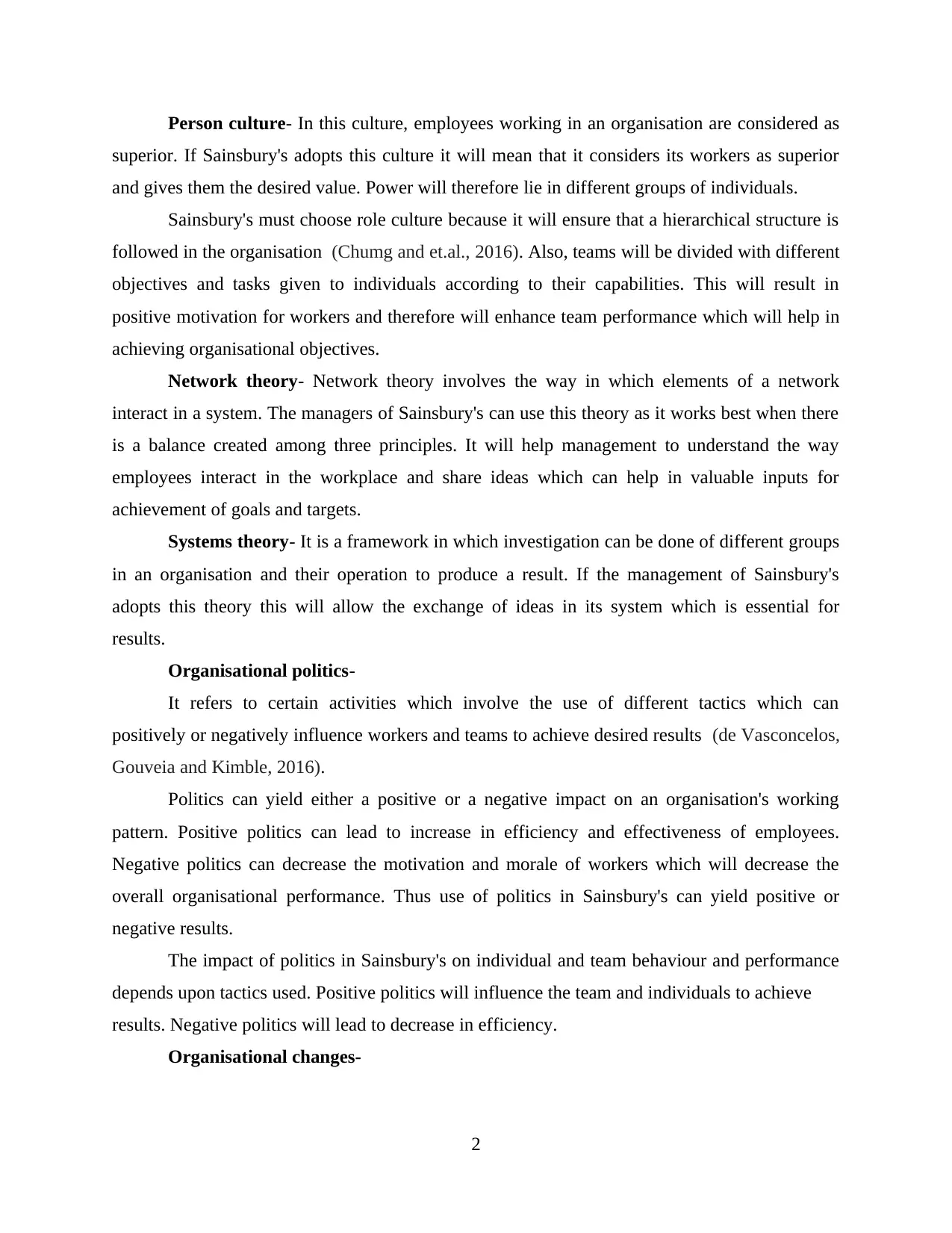
Person culture- In this culture, employees working in an organisation are considered as
superior. If Sainsbury's adopts this culture it will mean that it considers its workers as superior
and gives them the desired value. Power will therefore lie in different groups of individuals.
Sainsbury's must choose role culture because it will ensure that a hierarchical structure is
followed in the organisation (Chumg and et.al., 2016). Also, teams will be divided with different
objectives and tasks given to individuals according to their capabilities. This will result in
positive motivation for workers and therefore will enhance team performance which will help in
achieving organisational objectives.
Network theory- Network theory involves the way in which elements of a network
interact in a system. The managers of Sainsbury's can use this theory as it works best when there
is a balance created among three principles. It will help management to understand the way
employees interact in the workplace and share ideas which can help in valuable inputs for
achievement of goals and targets.
Systems theory- It is a framework in which investigation can be done of different groups
in an organisation and their operation to produce a result. If the management of Sainsbury's
adopts this theory this will allow the exchange of ideas in its system which is essential for
results.
Organisational politics-
It refers to certain activities which involve the use of different tactics which can
positively or negatively influence workers and teams to achieve desired results (de Vasconcelos,
Gouveia and Kimble, 2016).
Politics can yield either a positive or a negative impact on an organisation's working
pattern. Positive politics can lead to increase in efficiency and effectiveness of employees.
Negative politics can decrease the motivation and morale of workers which will decrease the
overall organisational performance. Thus use of politics in Sainsbury's can yield positive or
negative results.
The impact of politics in Sainsbury's on individual and team behaviour and performance
depends upon tactics used. Positive politics will influence the team and individuals to achieve
results. Negative politics will lead to decrease in efficiency.
Organisational changes-
2
superior. If Sainsbury's adopts this culture it will mean that it considers its workers as superior
and gives them the desired value. Power will therefore lie in different groups of individuals.
Sainsbury's must choose role culture because it will ensure that a hierarchical structure is
followed in the organisation (Chumg and et.al., 2016). Also, teams will be divided with different
objectives and tasks given to individuals according to their capabilities. This will result in
positive motivation for workers and therefore will enhance team performance which will help in
achieving organisational objectives.
Network theory- Network theory involves the way in which elements of a network
interact in a system. The managers of Sainsbury's can use this theory as it works best when there
is a balance created among three principles. It will help management to understand the way
employees interact in the workplace and share ideas which can help in valuable inputs for
achievement of goals and targets.
Systems theory- It is a framework in which investigation can be done of different groups
in an organisation and their operation to produce a result. If the management of Sainsbury's
adopts this theory this will allow the exchange of ideas in its system which is essential for
results.
Organisational politics-
It refers to certain activities which involve the use of different tactics which can
positively or negatively influence workers and teams to achieve desired results (de Vasconcelos,
Gouveia and Kimble, 2016).
Politics can yield either a positive or a negative impact on an organisation's working
pattern. Positive politics can lead to increase in efficiency and effectiveness of employees.
Negative politics can decrease the motivation and morale of workers which will decrease the
overall organisational performance. Thus use of politics in Sainsbury's can yield positive or
negative results.
The impact of politics in Sainsbury's on individual and team behaviour and performance
depends upon tactics used. Positive politics will influence the team and individuals to achieve
results. Negative politics will lead to decrease in efficiency.
Organisational changes-
2
Paraphrase This Document
Need a fresh take? Get an instant paraphrase of this document with our AI Paraphraser
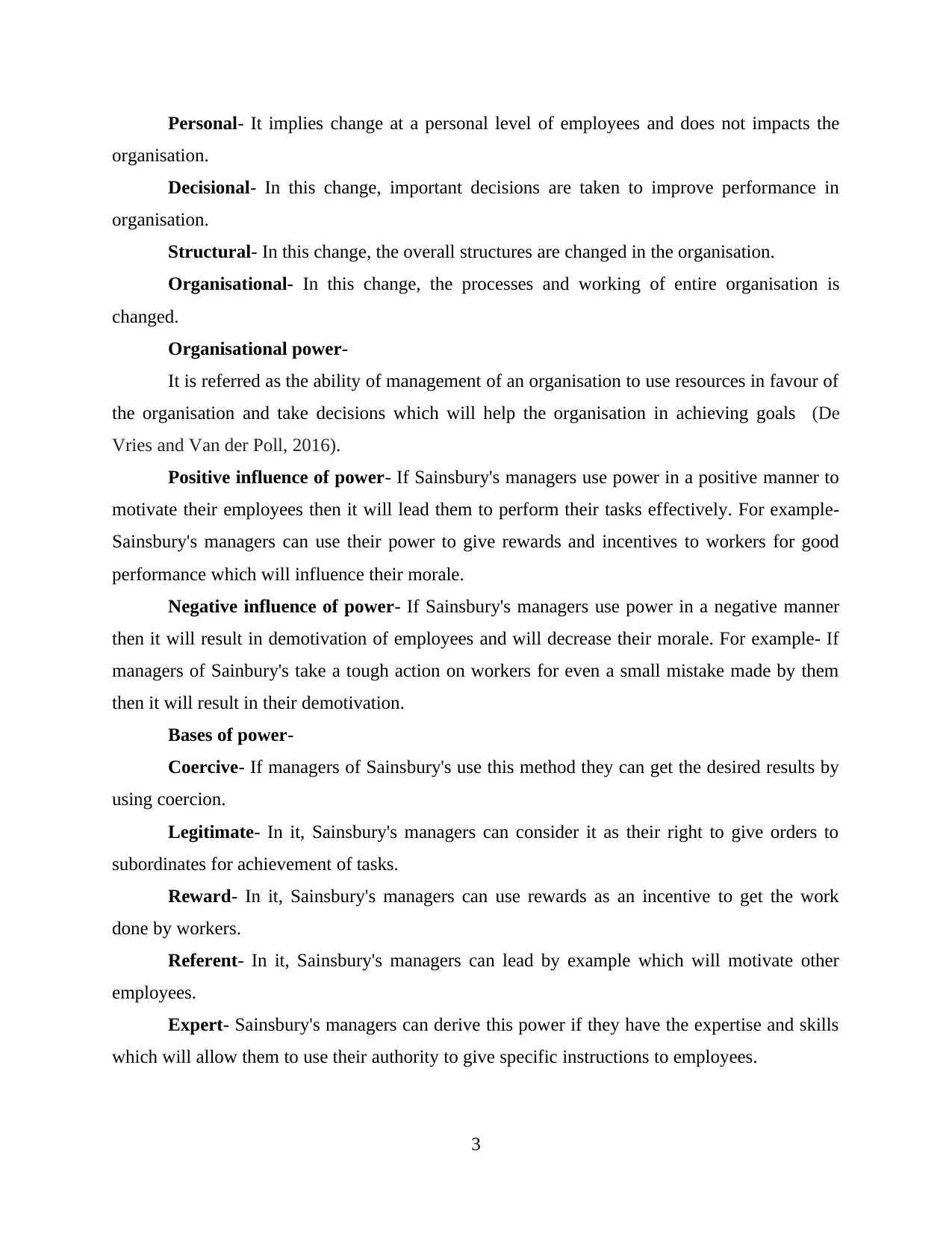
Personal- It implies change at a personal level of employees and does not impacts the
organisation.
Decisional- In this change, important decisions are taken to improve performance in
organisation.
Structural- In this change, the overall structures are changed in the organisation.
Organisational- In this change, the processes and working of entire organisation is
changed.
Organisational power-
It is referred as the ability of management of an organisation to use resources in favour of
the organisation and take decisions which will help the organisation in achieving goals (De
Vries and Van der Poll, 2016).
Positive influence of power- If Sainsbury's managers use power in a positive manner to
motivate their employees then it will lead them to perform their tasks effectively. For example-
Sainsbury's managers can use their power to give rewards and incentives to workers for good
performance which will influence their morale.
Negative influence of power- If Sainsbury's managers use power in a negative manner
then it will result in demotivation of employees and will decrease their morale. For example- If
managers of Sainbury's take a tough action on workers for even a small mistake made by them
then it will result in their demotivation.
Bases of power-
Coercive- If managers of Sainsbury's use this method they can get the desired results by
using coercion.
Legitimate- In it, Sainsbury's managers can consider it as their right to give orders to
subordinates for achievement of tasks.
Reward- In it, Sainsbury's managers can use rewards as an incentive to get the work
done by workers.
Referent- In it, Sainsbury's managers can lead by example which will motivate other
employees.
Expert- Sainsbury's managers can derive this power if they have the expertise and skills
which will allow them to use their authority to give specific instructions to employees.
3
organisation.
Decisional- In this change, important decisions are taken to improve performance in
organisation.
Structural- In this change, the overall structures are changed in the organisation.
Organisational- In this change, the processes and working of entire organisation is
changed.
Organisational power-
It is referred as the ability of management of an organisation to use resources in favour of
the organisation and take decisions which will help the organisation in achieving goals (De
Vries and Van der Poll, 2016).
Positive influence of power- If Sainsbury's managers use power in a positive manner to
motivate their employees then it will lead them to perform their tasks effectively. For example-
Sainsbury's managers can use their power to give rewards and incentives to workers for good
performance which will influence their morale.
Negative influence of power- If Sainsbury's managers use power in a negative manner
then it will result in demotivation of employees and will decrease their morale. For example- If
managers of Sainbury's take a tough action on workers for even a small mistake made by them
then it will result in their demotivation.
Bases of power-
Coercive- If managers of Sainsbury's use this method they can get the desired results by
using coercion.
Legitimate- In it, Sainsbury's managers can consider it as their right to give orders to
subordinates for achievement of tasks.
Reward- In it, Sainsbury's managers can use rewards as an incentive to get the work
done by workers.
Referent- In it, Sainsbury's managers can lead by example which will motivate other
employees.
Expert- Sainsbury's managers can derive this power if they have the expertise and skills
which will allow them to use their authority to give specific instructions to employees.
3
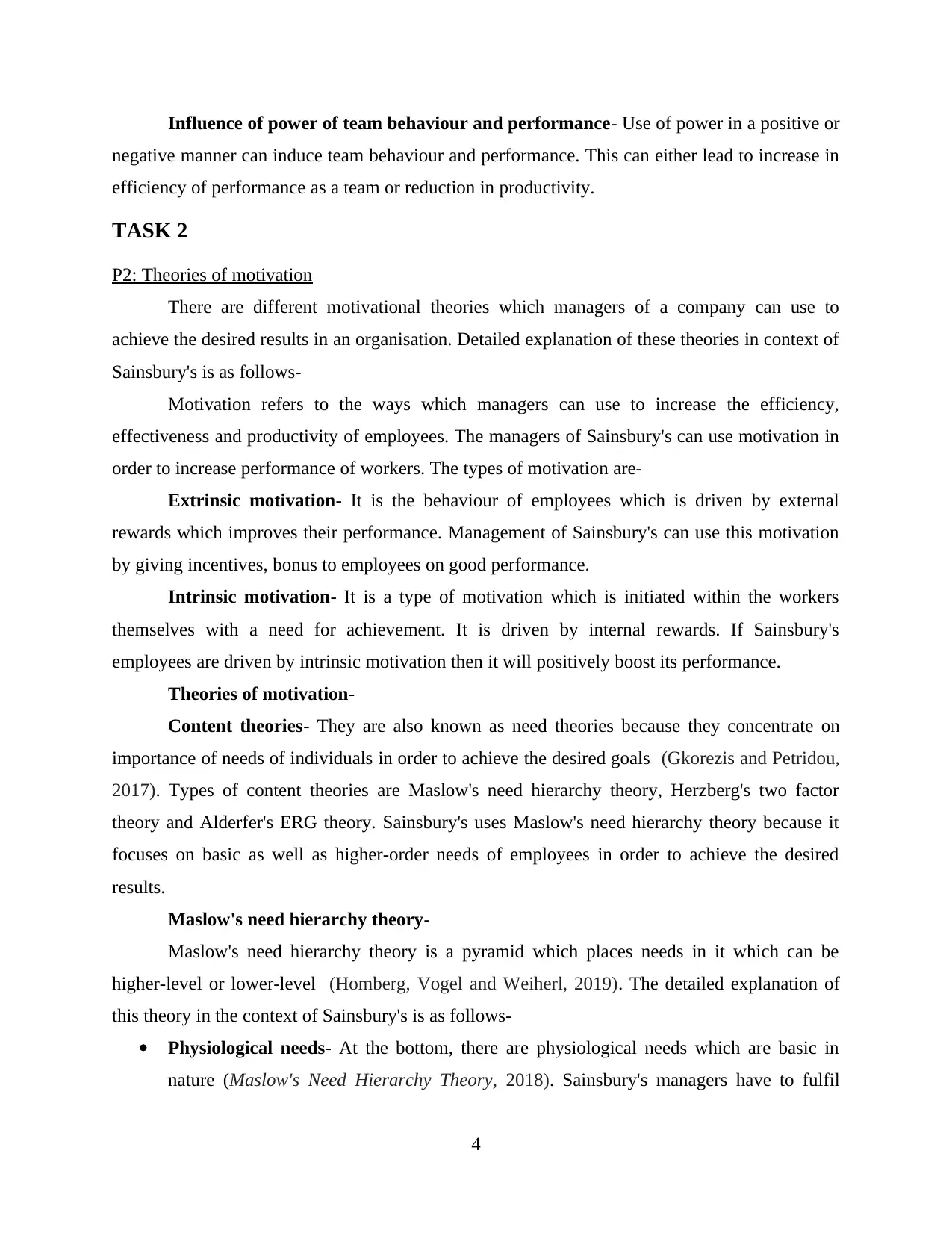
Influence of power of team behaviour and performance- Use of power in a positive or
negative manner can induce team behaviour and performance. This can either lead to increase in
efficiency of performance as a team or reduction in productivity.
TASK 2
P2: Theories of motivation
There are different motivational theories which managers of a company can use to
achieve the desired results in an organisation. Detailed explanation of these theories in context of
Sainsbury's is as follows-
Motivation refers to the ways which managers can use to increase the efficiency,
effectiveness and productivity of employees. The managers of Sainsbury's can use motivation in
order to increase performance of workers. The types of motivation are-
Extrinsic motivation- It is the behaviour of employees which is driven by external
rewards which improves their performance. Management of Sainsbury's can use this motivation
by giving incentives, bonus to employees on good performance.
Intrinsic motivation- It is a type of motivation which is initiated within the workers
themselves with a need for achievement. It is driven by internal rewards. If Sainsbury's
employees are driven by intrinsic motivation then it will positively boost its performance.
Theories of motivation-
Content theories- They are also known as need theories because they concentrate on
importance of needs of individuals in order to achieve the desired goals (Gkorezis and Petridou,
2017). Types of content theories are Maslow's need hierarchy theory, Herzberg's two factor
theory and Alderfer's ERG theory. Sainsbury's uses Maslow's need hierarchy theory because it
focuses on basic as well as higher-order needs of employees in order to achieve the desired
results.
Maslow's need hierarchy theory-
Maslow's need hierarchy theory is a pyramid which places needs in it which can be
higher-level or lower-level (Homberg, Vogel and Weiherl, 2019). The detailed explanation of
this theory in the context of Sainsbury's is as follows-
Physiological needs- At the bottom, there are physiological needs which are basic in
nature (Maslow's Need Hierarchy Theory, 2018). Sainsbury's managers have to fulfil
4
negative manner can induce team behaviour and performance. This can either lead to increase in
efficiency of performance as a team or reduction in productivity.
TASK 2
P2: Theories of motivation
There are different motivational theories which managers of a company can use to
achieve the desired results in an organisation. Detailed explanation of these theories in context of
Sainsbury's is as follows-
Motivation refers to the ways which managers can use to increase the efficiency,
effectiveness and productivity of employees. The managers of Sainsbury's can use motivation in
order to increase performance of workers. The types of motivation are-
Extrinsic motivation- It is the behaviour of employees which is driven by external
rewards which improves their performance. Management of Sainsbury's can use this motivation
by giving incentives, bonus to employees on good performance.
Intrinsic motivation- It is a type of motivation which is initiated within the workers
themselves with a need for achievement. It is driven by internal rewards. If Sainsbury's
employees are driven by intrinsic motivation then it will positively boost its performance.
Theories of motivation-
Content theories- They are also known as need theories because they concentrate on
importance of needs of individuals in order to achieve the desired goals (Gkorezis and Petridou,
2017). Types of content theories are Maslow's need hierarchy theory, Herzberg's two factor
theory and Alderfer's ERG theory. Sainsbury's uses Maslow's need hierarchy theory because it
focuses on basic as well as higher-order needs of employees in order to achieve the desired
results.
Maslow's need hierarchy theory-
Maslow's need hierarchy theory is a pyramid which places needs in it which can be
higher-level or lower-level (Homberg, Vogel and Weiherl, 2019). The detailed explanation of
this theory in the context of Sainsbury's is as follows-
Physiological needs- At the bottom, there are physiological needs which are basic in
nature (Maslow's Need Hierarchy Theory, 2018). Sainsbury's managers have to fulfil
4
⊘ This is a preview!⊘
Do you want full access?
Subscribe today to unlock all pages.

Trusted by 1+ million students worldwide
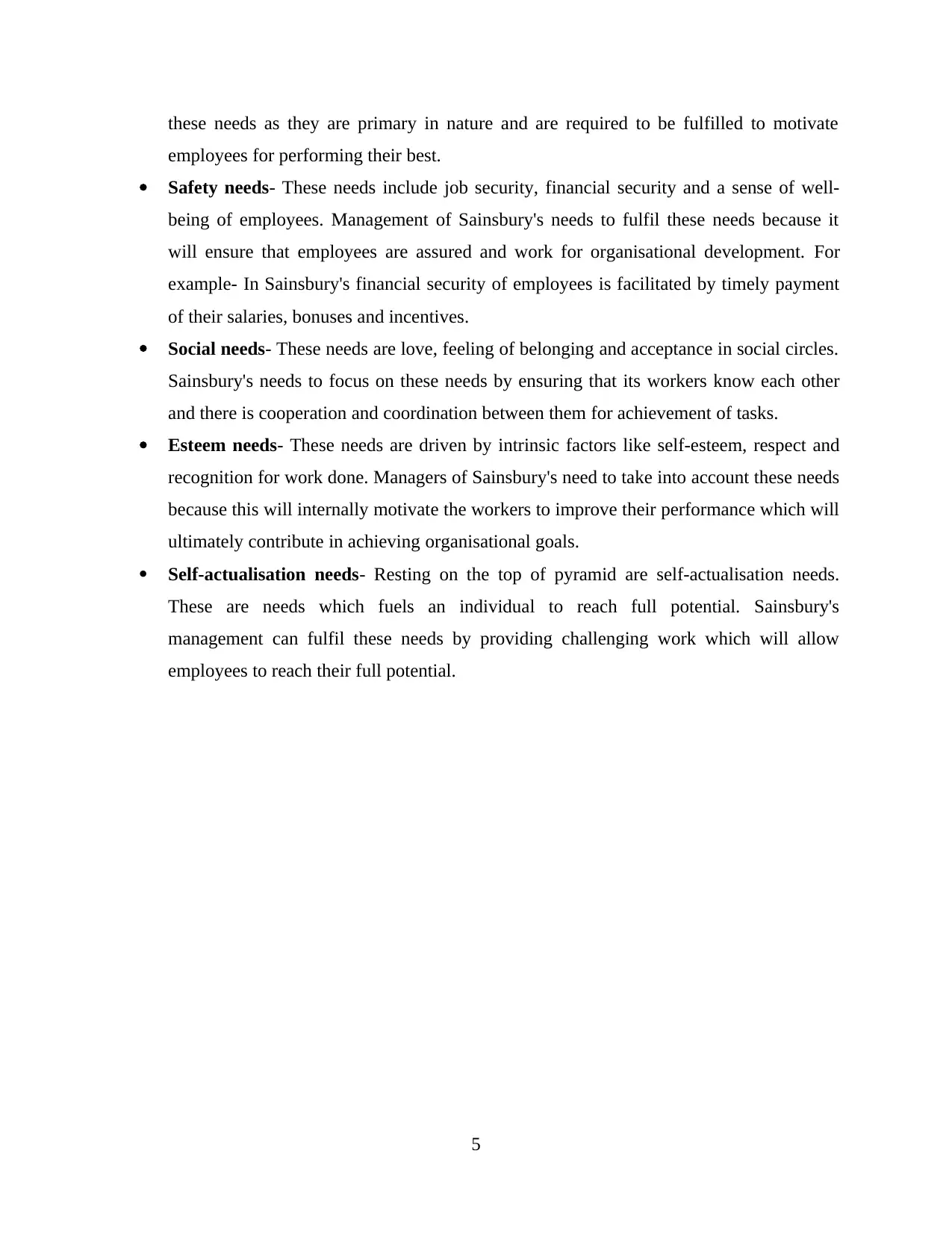
these needs as they are primary in nature and are required to be fulfilled to motivate
employees for performing their best.
Safety needs- These needs include job security, financial security and a sense of well-
being of employees. Management of Sainsbury's needs to fulfil these needs because it
will ensure that employees are assured and work for organisational development. For
example- In Sainsbury's financial security of employees is facilitated by timely payment
of their salaries, bonuses and incentives.
Social needs- These needs are love, feeling of belonging and acceptance in social circles.
Sainsbury's needs to focus on these needs by ensuring that its workers know each other
and there is cooperation and coordination between them for achievement of tasks.
Esteem needs- These needs are driven by intrinsic factors like self-esteem, respect and
recognition for work done. Managers of Sainsbury's need to take into account these needs
because this will internally motivate the workers to improve their performance which will
ultimately contribute in achieving organisational goals.
Self-actualisation needs- Resting on the top of pyramid are self-actualisation needs.
These are needs which fuels an individual to reach full potential. Sainsbury's
management can fulfil these needs by providing challenging work which will allow
employees to reach their full potential.
5
employees for performing their best.
Safety needs- These needs include job security, financial security and a sense of well-
being of employees. Management of Sainsbury's needs to fulfil these needs because it
will ensure that employees are assured and work for organisational development. For
example- In Sainsbury's financial security of employees is facilitated by timely payment
of their salaries, bonuses and incentives.
Social needs- These needs are love, feeling of belonging and acceptance in social circles.
Sainsbury's needs to focus on these needs by ensuring that its workers know each other
and there is cooperation and coordination between them for achievement of tasks.
Esteem needs- These needs are driven by intrinsic factors like self-esteem, respect and
recognition for work done. Managers of Sainsbury's need to take into account these needs
because this will internally motivate the workers to improve their performance which will
ultimately contribute in achieving organisational goals.
Self-actualisation needs- Resting on the top of pyramid are self-actualisation needs.
These are needs which fuels an individual to reach full potential. Sainsbury's
management can fulfil these needs by providing challenging work which will allow
employees to reach their full potential.
5
Paraphrase This Document
Need a fresh take? Get an instant paraphrase of this document with our AI Paraphraser
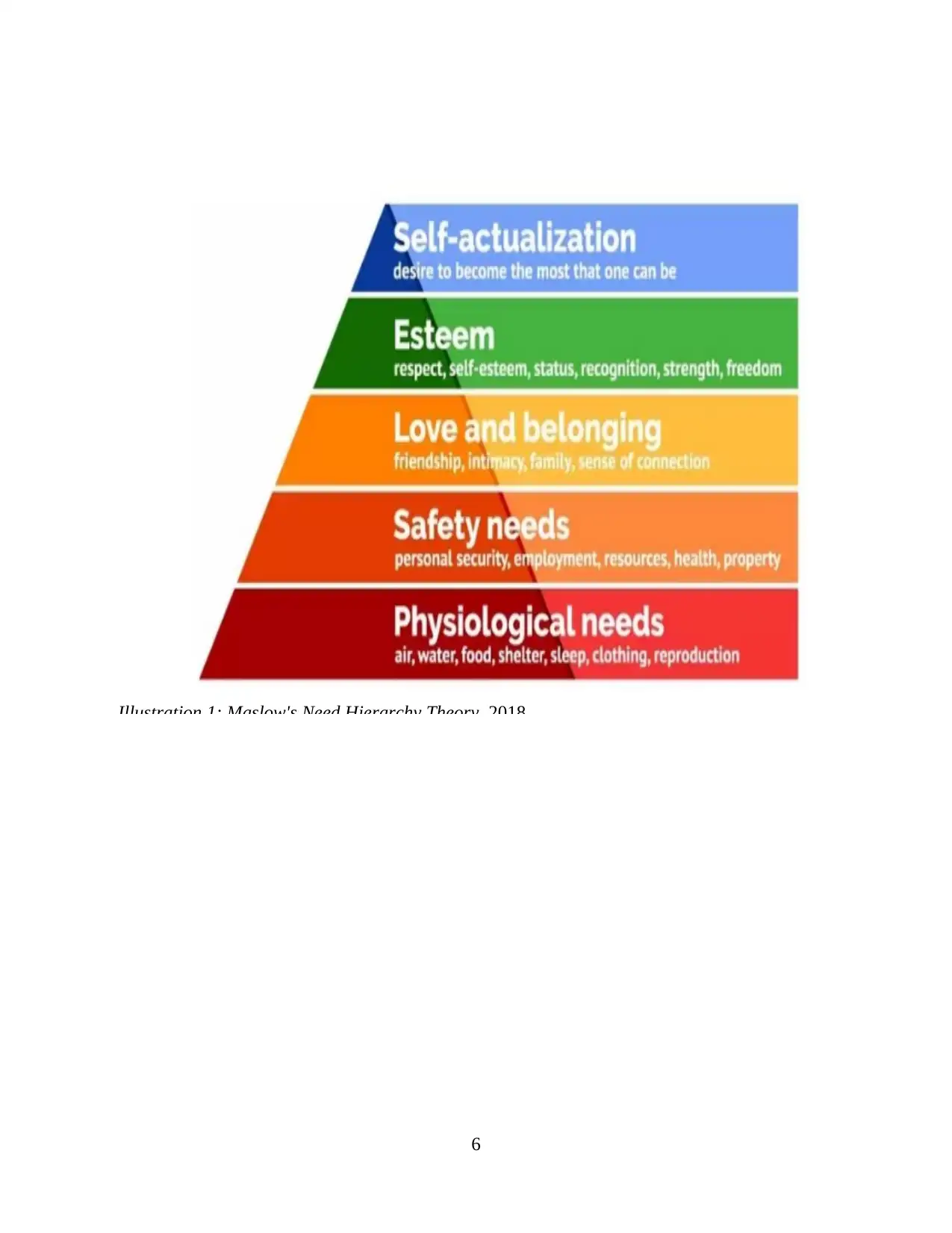
6
Illustration 1: Maslow's Need Hierarchy Theory, 2018
Illustration 1: Maslow's Need Hierarchy Theory, 2018
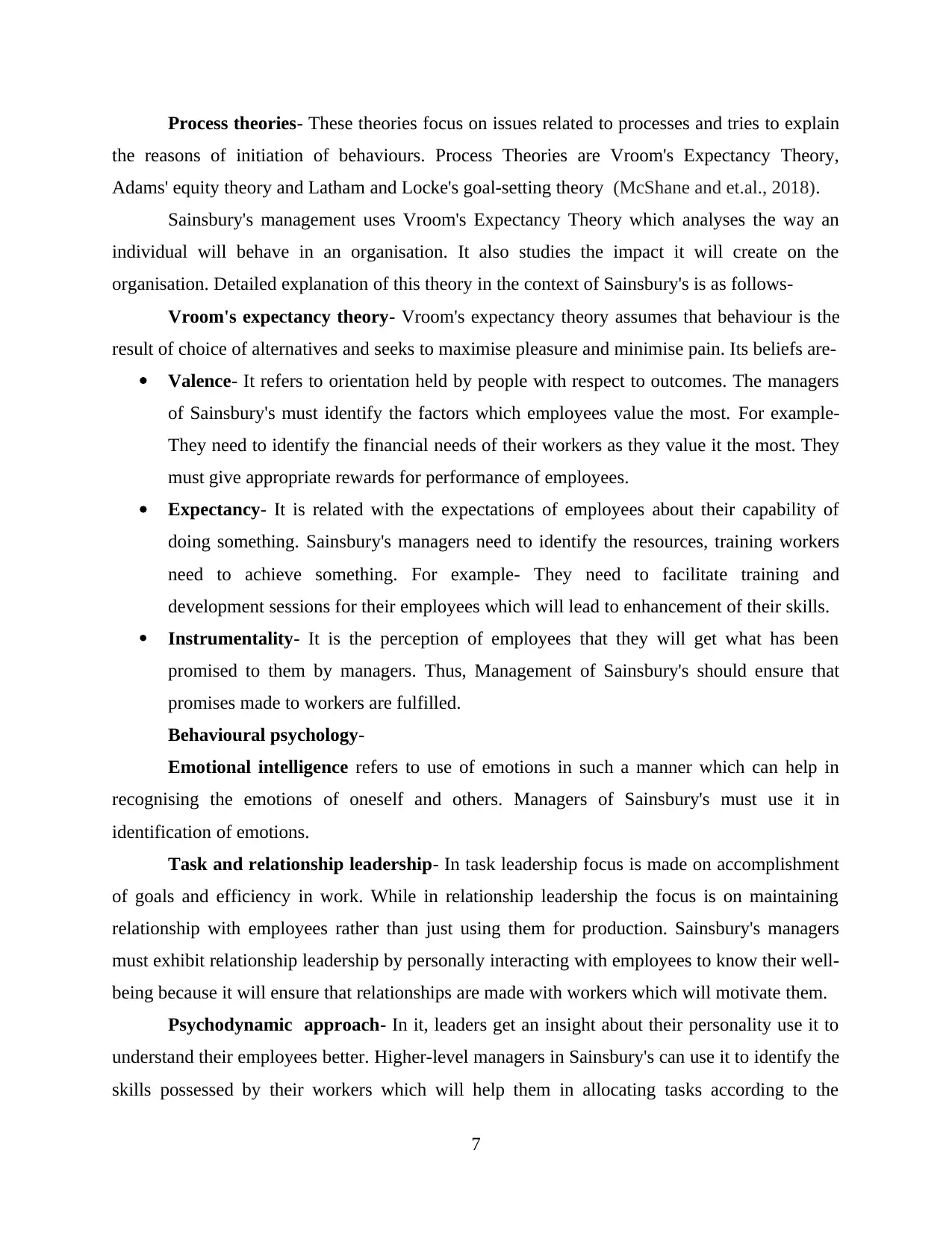
Process theories- These theories focus on issues related to processes and tries to explain
the reasons of initiation of behaviours. Process Theories are Vroom's Expectancy Theory,
Adams' equity theory and Latham and Locke's goal-setting theory (McShane and et.al., 2018).
Sainsbury's management uses Vroom's Expectancy Theory which analyses the way an
individual will behave in an organisation. It also studies the impact it will create on the
organisation. Detailed explanation of this theory in the context of Sainsbury's is as follows-
Vroom's expectancy theory- Vroom's expectancy theory assumes that behaviour is the
result of choice of alternatives and seeks to maximise pleasure and minimise pain. Its beliefs are-
Valence- It refers to orientation held by people with respect to outcomes. The managers
of Sainsbury's must identify the factors which employees value the most. For example-
They need to identify the financial needs of their workers as they value it the most. They
must give appropriate rewards for performance of employees.
Expectancy- It is related with the expectations of employees about their capability of
doing something. Sainsbury's managers need to identify the resources, training workers
need to achieve something. For example- They need to facilitate training and
development sessions for their employees which will lead to enhancement of their skills.
Instrumentality- It is the perception of employees that they will get what has been
promised to them by managers. Thus, Management of Sainsbury's should ensure that
promises made to workers are fulfilled.
Behavioural psychology-
Emotional intelligence refers to use of emotions in such a manner which can help in
recognising the emotions of oneself and others. Managers of Sainsbury's must use it in
identification of emotions.
Task and relationship leadership- In task leadership focus is made on accomplishment
of goals and efficiency in work. While in relationship leadership the focus is on maintaining
relationship with employees rather than just using them for production. Sainsbury's managers
must exhibit relationship leadership by personally interacting with employees to know their well-
being because it will ensure that relationships are made with workers which will motivate them.
Psychodynamic approach- In it, leaders get an insight about their personality use it to
understand their employees better. Higher-level managers in Sainsbury's can use it to identify the
skills possessed by their workers which will help them in allocating tasks according to the
7
the reasons of initiation of behaviours. Process Theories are Vroom's Expectancy Theory,
Adams' equity theory and Latham and Locke's goal-setting theory (McShane and et.al., 2018).
Sainsbury's management uses Vroom's Expectancy Theory which analyses the way an
individual will behave in an organisation. It also studies the impact it will create on the
organisation. Detailed explanation of this theory in the context of Sainsbury's is as follows-
Vroom's expectancy theory- Vroom's expectancy theory assumes that behaviour is the
result of choice of alternatives and seeks to maximise pleasure and minimise pain. Its beliefs are-
Valence- It refers to orientation held by people with respect to outcomes. The managers
of Sainsbury's must identify the factors which employees value the most. For example-
They need to identify the financial needs of their workers as they value it the most. They
must give appropriate rewards for performance of employees.
Expectancy- It is related with the expectations of employees about their capability of
doing something. Sainsbury's managers need to identify the resources, training workers
need to achieve something. For example- They need to facilitate training and
development sessions for their employees which will lead to enhancement of their skills.
Instrumentality- It is the perception of employees that they will get what has been
promised to them by managers. Thus, Management of Sainsbury's should ensure that
promises made to workers are fulfilled.
Behavioural psychology-
Emotional intelligence refers to use of emotions in such a manner which can help in
recognising the emotions of oneself and others. Managers of Sainsbury's must use it in
identification of emotions.
Task and relationship leadership- In task leadership focus is made on accomplishment
of goals and efficiency in work. While in relationship leadership the focus is on maintaining
relationship with employees rather than just using them for production. Sainsbury's managers
must exhibit relationship leadership by personally interacting with employees to know their well-
being because it will ensure that relationships are made with workers which will motivate them.
Psychodynamic approach- In it, leaders get an insight about their personality use it to
understand their employees better. Higher-level managers in Sainsbury's can use it to identify the
skills possessed by their workers which will help them in allocating tasks according to the
7
⊘ This is a preview!⊘
Do you want full access?
Subscribe today to unlock all pages.

Trusted by 1+ million students worldwide
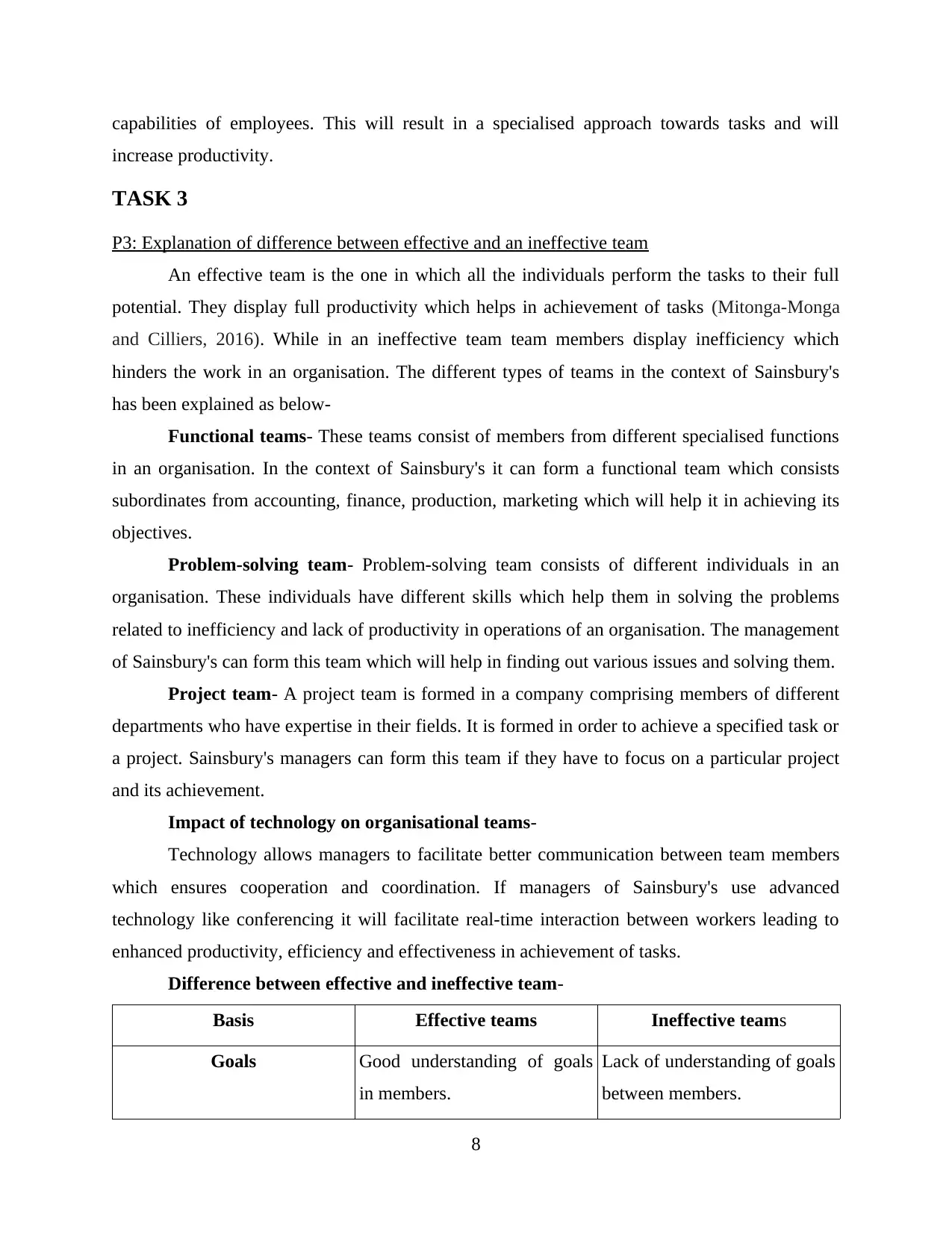
capabilities of employees. This will result in a specialised approach towards tasks and will
increase productivity.
TASK 3
P3: Explanation of difference between effective and an ineffective team
An effective team is the one in which all the individuals perform the tasks to their full
potential. They display full productivity which helps in achievement of tasks (Mitonga-Monga
and Cilliers, 2016). While in an ineffective team team members display inefficiency which
hinders the work in an organisation. The different types of teams in the context of Sainsbury's
has been explained as below-
Functional teams- These teams consist of members from different specialised functions
in an organisation. In the context of Sainsbury's it can form a functional team which consists
subordinates from accounting, finance, production, marketing which will help it in achieving its
objectives.
Problem-solving team- Problem-solving team consists of different individuals in an
organisation. These individuals have different skills which help them in solving the problems
related to inefficiency and lack of productivity in operations of an organisation. The management
of Sainsbury's can form this team which will help in finding out various issues and solving them.
Project team- A project team is formed in a company comprising members of different
departments who have expertise in their fields. It is formed in order to achieve a specified task or
a project. Sainsbury's managers can form this team if they have to focus on a particular project
and its achievement.
Impact of technology on organisational teams-
Technology allows managers to facilitate better communication between team members
which ensures cooperation and coordination. If managers of Sainsbury's use advanced
technology like conferencing it will facilitate real-time interaction between workers leading to
enhanced productivity, efficiency and effectiveness in achievement of tasks.
Difference between effective and ineffective team-
Basis Effective teams Ineffective teams
Goals Good understanding of goals
in members.
Lack of understanding of goals
between members.
8
increase productivity.
TASK 3
P3: Explanation of difference between effective and an ineffective team
An effective team is the one in which all the individuals perform the tasks to their full
potential. They display full productivity which helps in achievement of tasks (Mitonga-Monga
and Cilliers, 2016). While in an ineffective team team members display inefficiency which
hinders the work in an organisation. The different types of teams in the context of Sainsbury's
has been explained as below-
Functional teams- These teams consist of members from different specialised functions
in an organisation. In the context of Sainsbury's it can form a functional team which consists
subordinates from accounting, finance, production, marketing which will help it in achieving its
objectives.
Problem-solving team- Problem-solving team consists of different individuals in an
organisation. These individuals have different skills which help them in solving the problems
related to inefficiency and lack of productivity in operations of an organisation. The management
of Sainsbury's can form this team which will help in finding out various issues and solving them.
Project team- A project team is formed in a company comprising members of different
departments who have expertise in their fields. It is formed in order to achieve a specified task or
a project. Sainsbury's managers can form this team if they have to focus on a particular project
and its achievement.
Impact of technology on organisational teams-
Technology allows managers to facilitate better communication between team members
which ensures cooperation and coordination. If managers of Sainsbury's use advanced
technology like conferencing it will facilitate real-time interaction between workers leading to
enhanced productivity, efficiency and effectiveness in achievement of tasks.
Difference between effective and ineffective team-
Basis Effective teams Ineffective teams
Goals Good understanding of goals
in members.
Lack of understanding of goals
between members.
8
Paraphrase This Document
Need a fresh take? Get an instant paraphrase of this document with our AI Paraphraser
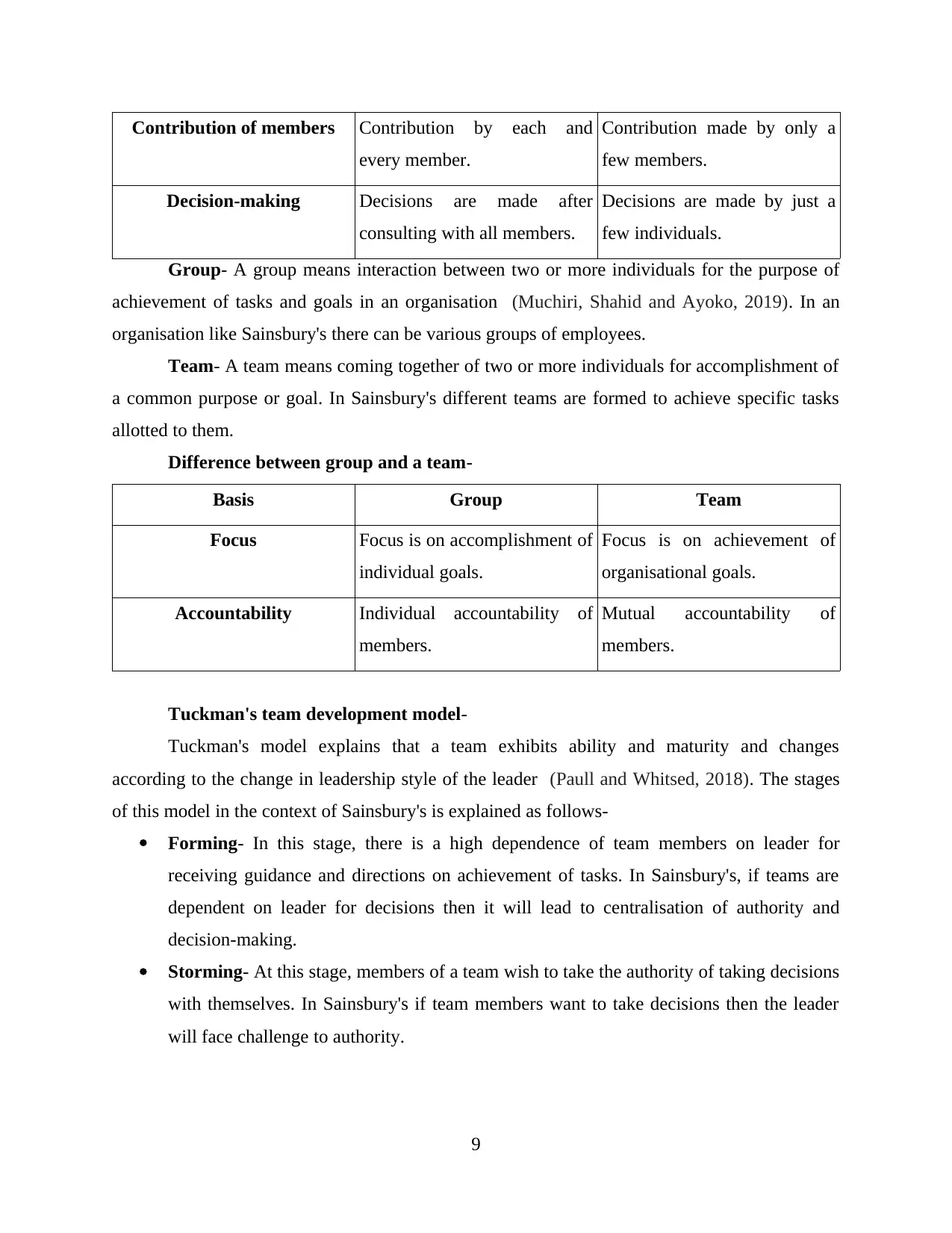
Contribution of members Contribution by each and
every member.
Contribution made by only a
few members.
Decision-making Decisions are made after
consulting with all members.
Decisions are made by just a
few individuals.
Group- A group means interaction between two or more individuals for the purpose of
achievement of tasks and goals in an organisation (Muchiri, Shahid and Ayoko, 2019). In an
organisation like Sainsbury's there can be various groups of employees.
Team- A team means coming together of two or more individuals for accomplishment of
a common purpose or goal. In Sainsbury's different teams are formed to achieve specific tasks
allotted to them.
Difference between group and a team-
Basis Group Team
Focus Focus is on accomplishment of
individual goals.
Focus is on achievement of
organisational goals.
Accountability Individual accountability of
members.
Mutual accountability of
members.
Tuckman's team development model-
Tuckman's model explains that a team exhibits ability and maturity and changes
according to the change in leadership style of the leader (Paull and Whitsed, 2018). The stages
of this model in the context of Sainsbury's is explained as follows-
Forming- In this stage, there is a high dependence of team members on leader for
receiving guidance and directions on achievement of tasks. In Sainsbury's, if teams are
dependent on leader for decisions then it will lead to centralisation of authority and
decision-making.
Storming- At this stage, members of a team wish to take the authority of taking decisions
with themselves. In Sainsbury's if team members want to take decisions then the leader
will face challenge to authority.
9
every member.
Contribution made by only a
few members.
Decision-making Decisions are made after
consulting with all members.
Decisions are made by just a
few individuals.
Group- A group means interaction between two or more individuals for the purpose of
achievement of tasks and goals in an organisation (Muchiri, Shahid and Ayoko, 2019). In an
organisation like Sainsbury's there can be various groups of employees.
Team- A team means coming together of two or more individuals for accomplishment of
a common purpose or goal. In Sainsbury's different teams are formed to achieve specific tasks
allotted to them.
Difference between group and a team-
Basis Group Team
Focus Focus is on accomplishment of
individual goals.
Focus is on achievement of
organisational goals.
Accountability Individual accountability of
members.
Mutual accountability of
members.
Tuckman's team development model-
Tuckman's model explains that a team exhibits ability and maturity and changes
according to the change in leadership style of the leader (Paull and Whitsed, 2018). The stages
of this model in the context of Sainsbury's is explained as follows-
Forming- In this stage, there is a high dependence of team members on leader for
receiving guidance and directions on achievement of tasks. In Sainsbury's, if teams are
dependent on leader for decisions then it will lead to centralisation of authority and
decision-making.
Storming- At this stage, members of a team wish to take the authority of taking decisions
with themselves. In Sainsbury's if team members want to take decisions then the leader
will face challenge to authority.
9
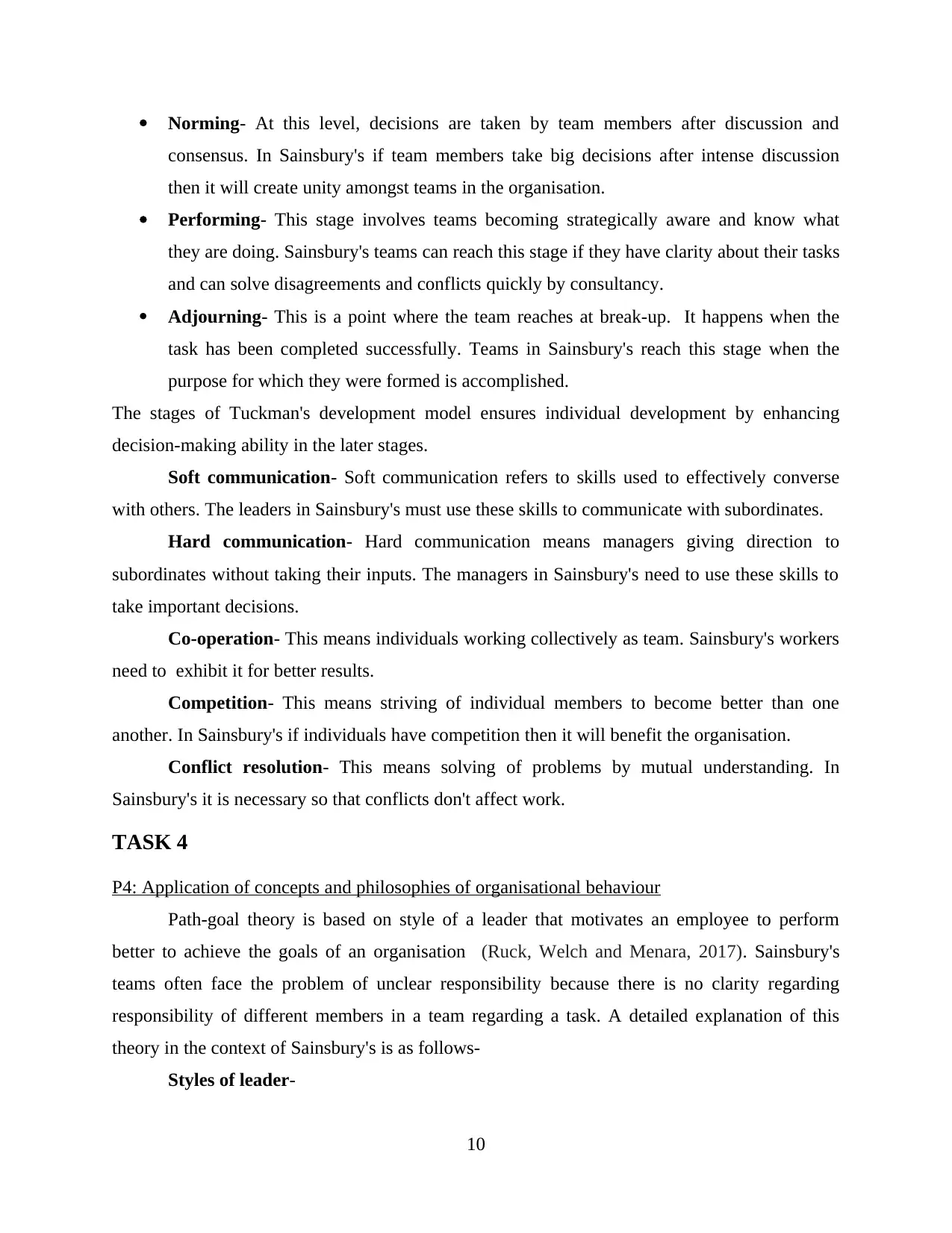
Norming- At this level, decisions are taken by team members after discussion and
consensus. In Sainsbury's if team members take big decisions after intense discussion
then it will create unity amongst teams in the organisation.
Performing- This stage involves teams becoming strategically aware and know what
they are doing. Sainsbury's teams can reach this stage if they have clarity about their tasks
and can solve disagreements and conflicts quickly by consultancy.
Adjourning- This is a point where the team reaches at break-up. It happens when the
task has been completed successfully. Teams in Sainsbury's reach this stage when the
purpose for which they were formed is accomplished.
The stages of Tuckman's development model ensures individual development by enhancing
decision-making ability in the later stages.
Soft communication- Soft communication refers to skills used to effectively converse
with others. The leaders in Sainsbury's must use these skills to communicate with subordinates.
Hard communication- Hard communication means managers giving direction to
subordinates without taking their inputs. The managers in Sainsbury's need to use these skills to
take important decisions.
Co-operation- This means individuals working collectively as team. Sainsbury's workers
need to exhibit it for better results.
Competition- This means striving of individual members to become better than one
another. In Sainsbury's if individuals have competition then it will benefit the organisation.
Conflict resolution- This means solving of problems by mutual understanding. In
Sainsbury's it is necessary so that conflicts don't affect work.
TASK 4
P4: Application of concepts and philosophies of organisational behaviour
Path-goal theory is based on style of a leader that motivates an employee to perform
better to achieve the goals of an organisation (Ruck, Welch and Menara, 2017). Sainsbury's
teams often face the problem of unclear responsibility because there is no clarity regarding
responsibility of different members in a team regarding a task. A detailed explanation of this
theory in the context of Sainsbury's is as follows-
Styles of leader-
10
consensus. In Sainsbury's if team members take big decisions after intense discussion
then it will create unity amongst teams in the organisation.
Performing- This stage involves teams becoming strategically aware and know what
they are doing. Sainsbury's teams can reach this stage if they have clarity about their tasks
and can solve disagreements and conflicts quickly by consultancy.
Adjourning- This is a point where the team reaches at break-up. It happens when the
task has been completed successfully. Teams in Sainsbury's reach this stage when the
purpose for which they were formed is accomplished.
The stages of Tuckman's development model ensures individual development by enhancing
decision-making ability in the later stages.
Soft communication- Soft communication refers to skills used to effectively converse
with others. The leaders in Sainsbury's must use these skills to communicate with subordinates.
Hard communication- Hard communication means managers giving direction to
subordinates without taking their inputs. The managers in Sainsbury's need to use these skills to
take important decisions.
Co-operation- This means individuals working collectively as team. Sainsbury's workers
need to exhibit it for better results.
Competition- This means striving of individual members to become better than one
another. In Sainsbury's if individuals have competition then it will benefit the organisation.
Conflict resolution- This means solving of problems by mutual understanding. In
Sainsbury's it is necessary so that conflicts don't affect work.
TASK 4
P4: Application of concepts and philosophies of organisational behaviour
Path-goal theory is based on style of a leader that motivates an employee to perform
better to achieve the goals of an organisation (Ruck, Welch and Menara, 2017). Sainsbury's
teams often face the problem of unclear responsibility because there is no clarity regarding
responsibility of different members in a team regarding a task. A detailed explanation of this
theory in the context of Sainsbury's is as follows-
Styles of leader-
10
⊘ This is a preview!⊘
Do you want full access?
Subscribe today to unlock all pages.

Trusted by 1+ million students worldwide
1 out of 16
Related Documents
Your All-in-One AI-Powered Toolkit for Academic Success.
+13062052269
info@desklib.com
Available 24*7 on WhatsApp / Email
![[object Object]](/_next/static/media/star-bottom.7253800d.svg)
Unlock your academic potential
Copyright © 2020–2025 A2Z Services. All Rights Reserved. Developed and managed by ZUCOL.





